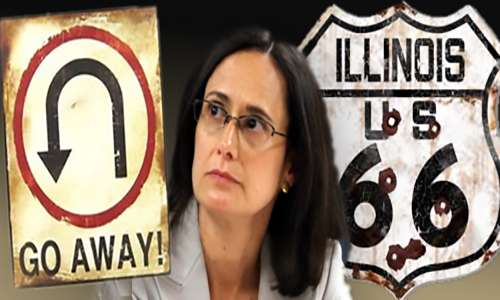Illinois Attorney General Declares DFS to be Illegal Gambling
Eight states down, forty-two to go. The daily fantasy sports (DFS) industry is watching its market slowly shrink in the United States as Illinois has become the latest state to attempt to prohibit the popular pastime. On Wednesday, Illinois Attorney General Lisa Madigan declared that DFS constitutes illegal gambling, doing so in one of the more measured, reasonable rulings we have seen.
 In a fourteen-page document dated December 23rd, 2015, Madigan went through her analysis of the situation, specifically addressing her ruling to State Representatives Elgie Sims, Jr. and Scott Drury, the Chairman and Vice Chairman, respectively, of the House Judiciary – Criminal Committee. They had asked Madigan whether or not daily fantasy sports were considered gambling under Illinois law and, as we can see, she took the time to study the matter and obliged.
In a fourteen-page document dated December 23rd, 2015, Madigan went through her analysis of the situation, specifically addressing her ruling to State Representatives Elgie Sims, Jr. and Scott Drury, the Chairman and Vice Chairman, respectively, of the House Judiciary – Criminal Committee. They had asked Madigan whether or not daily fantasy sports were considered gambling under Illinois law and, as we can see, she took the time to study the matter and obliged.
Madigan’s ruling boils down to her interpretation of the following portion of subsection 28-1(a) of the Criminal Code (emphasis added):
(a) A person commits gambling when he or she:
(1) knowingly plays a game of chance or skill for money or other thing of value; unless excepted in subsection (b) of this Section;
***
(12) knowingly establishes, maintains, or operates an Internet site that permits a person to play a game of chance or skill for money or other thing of value by means of the Internet or to make a wager upon the result of any game, contest, political nomination, appointment, or election by means of the Internet.
As we well know, the DFS sites, particularly the ones at the center of this year’s controversy, DraftKings and FanDuel, have pointed to the notion that DFS is a game of skill as the reason why it is not gambling. But in the case of Illinois, this defense fails, as Madigan points out that it just doesn’t matter:
The statutory language is straightforward and unequivocal. It clearly declares that all games of chance or skill, when played for money, are illegal gambling in Illinois, unless excepted. While the Contest Organizers assert that daily fantasy sports contests are games of skill’ rather than games of chance, that argument is immaterial because subsection 28-1(a)(1) expressly encompasses both.
Madigan adds that DraftKings and FanDuel also point to the following exception in Illinois law as another reason why DFS is not gambling:
(b) Participants in any of the following activities shall not be convicted of gambling:
* * *
(2) Offers of prizes, award or compensation to the actual contestants in any bona fide contest for the determination of skill, speed, strength or endurance or to the owners of animals or vehicles entered in such contest.
She refutes their argument, writing:
Reading the statute as a whole, it is clear that subsection 28-1(b)(2) applies only to the “actual contestants” in the actual sporting event.’ In the context of daily fantasy sports, the “actual contestant” upon whose performance success or failure is based is the athlete or athletes whose “skill, speed, strength or endurance” determine the outcome. Thus, subsection 28-1(b)(2) exempts only those who actually engage in a bona fide contest for the determination of skill, speed, strength, or endurance, and not a daily fantasy sports contest participant who pays a fee to build a “team” and who may win a prize based on the statistical performance of particular athletes.
Madigan also supports her position by citing a decade-old Texas case.
One interesting aspect of Madigan’s ruling is that it seems to say that ALL fantasy sports played for money are illegal, not just daily fantasy. For some preposterous reason, many people (see: New York Attorney General Eric Schneiderman) think that season-long fantasy sports are NOT gambling, while daily fantasy was born from Satan’s nethers. Though Madigan specifically addresses DraftKings and FanDuel, along with the DFS industry, her decision does look like season-long fantasy should be lumped into the “gambling” pile.
FanDuel, as it is wont to do when something doesn’t go its way, released a statement about Madigan’s ruling. It makes little sense:
Chicago may be the best sports town in the country. It’s a city — and Illinois is a state — that plays fantasy sports like almost no other. “The League” is even set in Illinois. So why the Attorney General would tell her 13.5 million constituents they can’t play fantasy sports anymore as they know it — and make no mistake, her opinion bans all forms of fantasy sports played for money — is beyond us. Hopefully, the legislature will give back to the people of Illinois the games they love. A sports town like Chicago and a sports-loving state like Illinois deserves nothing less.
I enjoy fantasy sports. I’ve even made a few bucks this NFL season. And I also watched every episode of “The League” and am sad that I will no longer get to listen to Rafi’s insanity. But seriously, FanDuel. I’m starting to feel sorry for you.

















COMMENTS